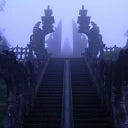The Sanskrit Meanings of Thailand’s Provinces
Originally posted on Indosphere.co
The name of Siam (Thailand) comes from the Sanskrit Syama, meaning “dark”. The capital of Siam, Ayutthaya, was named after Ayodhaya, the capital mentioned in the Ramayana.
Today’s Bangkok’s full name is as follows: “ Krung thep mahanakhon amon rattanakosin mahinthara ayuthaya mahadilok phop noppharat ratchathani burirom udomratchaniwet mahasathan amon piman awatan sathit sakkathattiya witsanukam prasit “
” The city of angels, the great city, the residence of the emerald Buddha, the impregnable city of Ayutthaya, of God Indra, the grand capital of the world endowed with nine precious gems, the happy city, abounding in an enormous royal palace that resembles the heavenly abode where reigns the reincarnated god, a city given by Indra and built by Vishnukarn “.
The map above shows 42 of Thailand’s ancient 76 provinces, and their Sanskrit meanings:
❇ 1. Chaiyaphum — Land (bhumi) of victory (jaya)
❇ 2. Phitsnulok — Country (loka) of Visnu
❇ 3. Uttaradit — Northern (uttara) city
❇ 4. Lobpuri — Originally Lavapuri the city of Lava the son of Rama
❇ 5. Ayuthaya — Ayodhaya the city of Rama
❇ 6. Saraburi — City (puri) of wealth (sara)
❇ 7. Nakhon Ratchasima — City (nagara) of the lion (sima) king (raja)
❇ 8. Chonburi — City (puri) of water (jala)
❇ 9. Chantaburi — Moon (chandra) city (puri)
❇ 10. Phetchaburi — City (buri) of food (bhojya).
❇ 11. Ratchaburi — City (puri) of kings (raja)
❇ 12. Kanchanaburi — City (puri) of gold (kanchana)
❇ 13. Prachinburi — Ancient (pracin) city (puri)
❇ 14. Nakon Sawan — Heavenly (svarga) city (nagara)
❇ 15. Phetchabun — City (puri) of food (bhojya)
❇ 16. Kalasin — Black (kala) waters
❇ 17. Ubon Ratchathani — Royal (raja) lotus city (sthan)
❇ 18. Buriram — City (puri) of pleasure (ram)
❇ 19. Suphanaburi — City (puri) of gold (suvarna)
❇ 20. Surin — City of the God (sura) in (Indra)
❇ 21. Maha Sarakhan — Great (maha) wealth (sara) of gold (kanaka)
❇ 22. Sukhothai — City (sthana) of happiness (sukha)
❇ 24. Singburi — City (puri) of lions (simha)
❇ 25. Sakhon Nakhon — means the “city of cities” — the Sanskrit Sakala meaning “whole” “total” and Nagara meaning “city”
❇ 26. Nakhon Phanom — City (nagara) of the Mountain
❇ 27 Nong Bua Lamphu — It seems that “Lamphu” is the same as the Lamphun mentioned above as the 23rd city, and the “Bua” seems to be a shortened version of “Buana” which is Malay for “world” and this is from the Sanskrit “Bhuvana” meaning “world”.
❇ 28. Nakhon Pathom — First (prathama) city (nagara)
❇ 29. Pathum thani — Lotus (padma) flower town (sthana)
❇ 30. Sisaket — was originally “Sri Nakhon Lamduan”, with “Sri” meaning “wealth”, “lord” the “Nakhon”, Sanskrit “nagara” meaning “city” the original “Sri” forms the “Si” in “Sisaket”.
❇ 32. Samut Songkhram — War (sangrama) ocean (samudra)
❇ 33. Samut Sakhon — Oceans (samudra) lake (sagara)
❇ 34. Samut Prakan — Ocean (samudra) fortress (prakara)
❇ 35. Bangkok — Known to the natives as Krung thep as explained above
❇ 36. Nonthaburi — City (puri)
❇ 37. Prachuap Khiri Khan — City of gold (khan) mountains (giri)
❇ 38. Uthaithani — Northern (uttara) city (sthana)
Other names further down the map which are not visible are:
❇ 39. Yala — Net (jala)
❇ 40. Nakhon Si Thammarat — City (nagara) of the auspicious (sri) Dharma King (dharmaraj)
❇ 41. Narathiwat — Residence (vat) of wise (dhi) people (nara)
❇ 42 Surat thani — City (sthana) of the Sun (Surya) its actually named after the Indian city of Surat
Therefore, 42 names out of 76 Thailand’s provinces, are clearly understandable in Sanskrit and many of the others we either have no information to their meaning or they are new names which have gained their independence such as the province of Sa Kaew which was originally part of Prachin Buri, a Sanskrit name meaning “ancient city”.
Running alongside Thailand, Burma and Cambodia is the Mekong river, a river which is known as the “mother of waters”. The Chinese name for this river is “Meigong” — the river has most probably derived its name from “Ma Ganga”.
